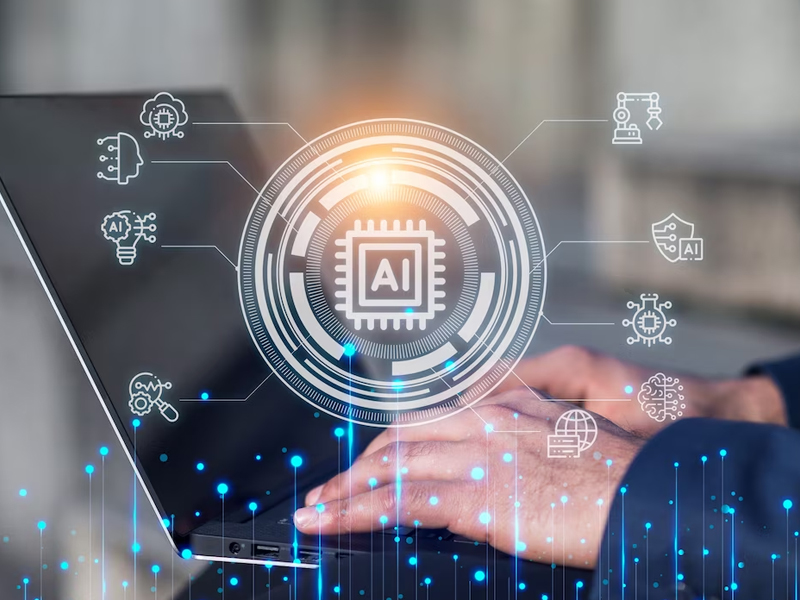
Man-made consciousness is ready to alterhow organizations source, assess, and match ability in the years to come. As anearly trendsetter in man-made intelligence-controlled selecting arrangements,we're eager to share the experiences on genuine applications previously comingto fruition across the staffing area.
From more complex applicant screening andabilities testing to upgraded consistency, client support, and vocationinstructing - smart advancements are progressively improving work processes andresults. Nonetheless, their capable use remains essential to expand benefitsfor all partners.
Here this blog will investigate both theopen doors artificial intelligence presents and significant contemplationsaround issues like predisposition, security, oversight, and occupationdisturbance. Objective of the blog is to advance the conversation and guideassociations looking for an upper hand through rising devices.
What is AI?
Computerized reasoning, ordinarily known assimulated intelligence, is the reproduction of human knowledge in machinescustomized to think like people and copy their activities. Artificialintelligence frameworks can be prepared to achieve explicit undertakingsoverwhelmingly of information and perceiving designs in the information. A fewinstances of errands where simulated intelligence is now being utilizedincorporate visual discernment, discourse acknowledgment, direction, andinterpretation between dialects.
In recent times, AI has been disrupting andtransforming industries at an unprecedented pace. The staffing and recruitingindustry is one such area witnessing the widespread adoption of AItechnologies. By leveraging AI, staffing firms can now automate repetitivetasks, and source and match candidates faster and more effectively. Advanced AIalgorithms are helping recruiters and hiring managers focus more on high-level,strategic tasks by taking care of initial screening, scheduling interviews, andmanaging hiring workflows.
Resume Screening and Candidate Matching
One of the most significant ways AI isaugmenting human recruiters is through automated resume screening and candidatematching. Powerful NLP and machine learning algorithms can scan throughhundreds and thousands of resumes in a fraction of the time it would takehumans. The AI systems learn to understand key skills, qualifications, andexperiences mentioned in the resumes and can automatically identify the mostrelevant candidates that match a particular job description. This initialscreening and matching helps recruiters focus only on top prospects, savingthem hours of manual screening work. AI tools now handle the initial filteringso recruiters can devote more time to interviewing qualified candidates.
Benefits of AI-driven candidate matching
AI technology is bringing about tremendoustransformations in the candidate matching and talent acquisition processes forstaffing firms. Leveraging powerful machine learning algorithms, AI systems arenow able to perform an extremely thorough analysis of job descriptions andcandidate profiles to identify the best matches between open roles and suitablejob-seekers. This AI-driven approach to candidate matching provides severalcompelling benefits:
- Faster time-to-fill - AI can evaluate thousands of resumes per minute and surface top candidates instantaneously.
- Improved quality of hires - By comprehending nuanced skills, AI matches far more accurately than humans scanning simple keywords.
- Expanded spotter efficiency - Scouts invest less energy on routine screening and more on high-esteem commitment.
- Versatility to oversee higher volumes - Computerization permits firms to handle greater candidate pools without adding headcount.
- Cost investment funds and advancements - Computer-based intelligence diminishes costs related to the enrolment cycle.
- Information-driven experiences - Investigation from computer-based intelligence matching guides key ability procurement independent direction.
This enables recruiters to place the rightcandidates in open roles faster and more efficiently.
Predictive Analytics for Talent Acquisition
Leveraging powerful predictive analytics ishelping staffing firms revolutionize their talent acquisition approach. Byutilizing AI, sophisticated algorithms can now analyze historical hiring datapatterns to:
- Forecast demand: AI predicts future talent needs based on business projections, seasonality patterns, and past demand cycles.
- Source proactively: Recruiters can build pipelines in advance of anticipated demand based on the probability of roles needing to be filled.
- Match proactively: Likelihood matching through computer-based intelligence proactively tracks down the most reasonable possibility for anticipated impending jobs.
- Hold top entertainers: Prescient examination assists with distinguishing top up-and-comers and clients for designated maintenance missions to keep up with long-haul connections.
This is enabling recruitment to transitionfrom reactive to proactive mode through data-driven anticipatory action.
Chatbots and Virtual Assistants for Candidate Engagement
Artificial intelligence partneradvancements like chatbots and virtual enrollment specialists are by and largebroadly taken on by staffing firms to further develop the up-and-comerexperience all through the enlistment lifecycle. Following are some of the waysin which chatbots and virtual assistants are helping in candidate engagement-
Bias Reduction and Diversity Enhancement
By removing human subjectivities, AI ishelping reduce inherent biases in recruitment and enhance diversity in hiring.Training algorithms on vast, diverse datasets ensures they do not exhibitpreferences based on attributes like gender, ethnicity, age, etc. When used fortasks like screening resumes, AI judge’s candidates solely based on qualificationsand merit rather than accidental biases. This ensures underrepresented groupsget equal opportunity and consideration. AI techniques can also anonymizepersonal details during initial matching, focusing only on skills. Researchersare actively working on algorithms that recommend diverse slates of candidatesto avoid homogeneous hiring. As AI models keep learning, they are advancinginclusion and fairness in recruitment. This improved objectivity throughtechnology is opening new doors for talent from all walks of life.
Onboarding and Training with AI
AI is also enhancing the onboarding andtraining process for new hires. Using chatbots and virtual agents, firms cannow provide orientation and onboarding assistance remotely. Digital helpersguide employees through getting systems set up, completing compliancerequirements, and getting familiar with organizational processes throughinteractive self-paced modules. AI then monitors individual progress andrecommends personalized skill development resources.
Computer vision and augmented reality toolsallow hands-on simulated practice for safety procedures before in-personworkshops. Intelligent virtual trainers supported by multimedia help retainknowledge better. AI even analyzes performance to suggest customized coursecorrections. This new paradigm of AI-powered onboarding and training ensures asmooth transition and rapid productivity for new members of the workforce.
Employee Retention and Performance Management
AI is also proving valuable for staffingfirms in retaining top talent and improving employee performance. Systemsutilizing natural language processing review help desk conversations andfeedback to identify sentiment. They pinpoint risks of attrition and recommendactions like rewards, recognition, or skill development. Managers gain insightsthrough AI-driven dashboards on metrics like productivity, accurately measuredthrough automated digital workflows.
Prescriptive analytics further advisetargeted training, mentoring, or job modifications as remedial or developmentsteps. AI assists stay interviews by offering questions and helping detect anyconcerns early. Automated performance evaluations leave more time fordevelopmental coaching. These retention initiatives enabled by AI analyticsboost workforce stability and quality of service for client businesses.
Compliance and Regulatory Assistance
Chatbots and virtualassistants can effectively assist organizations with compliance and regulatoryrequirements related to candidate engagement. They can provide candidates withimmediate, automated responses to common questions about applications,interviews and recruitment processes. This ensures equal and fair treatment forall candidates as per labor laws. It also takes the load off recruitment teams,freeing them to focus more on strategic hiring and candidate experience.
Challenges and Ethical Considerations
As artificial intelligence turns out to bemore predominant in recruiting, it is significant for staffing firms to thinkabout key moral difficulties and guarantee their frameworks advance decency andstraightforwardness. A few regions that merit consideration include:
- Algorithmic Predisposition: Proactively testing for and alleviating predispositions in preparing information that could adversely affect specific gatherings
- Make sense of capacity: Guaranteeing applicants comprehend assessment processes and can demand more data about choices
- Information Protection and Security: Carrying out powerful assurances for delicate candidate data gathered by computer-based intelligence frameworks
- Work Relocation: Checking man-made intelligence's effect on the business scene and supporting any labor force advances through retraining or associations
- Consistent Oversight: Keeping up with administration techniques like reviews, criticism circles, and responsibility measures as innovation propels
Via cautiously dealing with thesedifficulties, the business can expand simulated intelligence's potential gainswhile building trust and elevating more even handed admittance to vocation opendoors for all.
Future Trends in AI and Staffing
As early adopters in the staffing spacekeep on acknowledging benefits, specialists expect much more extensive purposesof man-made reasoning proceeding:
- Progressed Coordinating and Selecting: Customized up-and-comer suggestions, more robotized outreach, ability relationship promoting
- Further developed Abilities Appraisal: Dynamic testing of mental and delicate abilities through reenacted workplaces and errands
- Expanded Meetings: Computer-based intelligence helped screening and interview assistance to diminish predisposition and increment proficiency
- Enhancing HR: Chatbots, virtual specialists, and other simulated intelligence assume control over essential HR requests and exchanges to save time
- Coordinated Information and Examination: Comprehensive ability pools and pipelines through met candidate following, HRIS, and different frameworks
By investigating rising regions like these,groundbreaking organizations can acquire new enlisting abilities whileadditionally planning to serve clients in the quickly changing positioncommercial center of tomorrow.
Conclusion
Artificial intelligence is revolutionizinghow staffing and recruiting is done. While robots cannot replace humans when itcomes to understanding nuanced human behaviours and emotions, AI assistants areproving invaluable in handling initial screening, data processing, andrepetitive administrative tasks. This allows recruiters to focus more onhigh-level responsibilities like developing talent pipelines, candidateexperience and relationship management. As the technology advances further, wecan expect an even tighter integration of humans and AI in the staffingprocess. Together they will transform how top talent is sourced and engaged inthe coming years.


